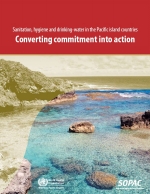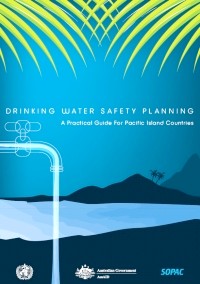News
YES | 1 | YES
New WHO and SOPAC Report Released: Sanitation, Hygiene and Drinking - Water in the Pacific Island Countries
04 November, 2011

26 October 2008, Suva, Fiji Islands

 |
26 October 2008, Suva, Fiji Islands
Efforts by Pacific island countries to improve sanitation, hygiene and drinking water will need to quintuple if the Pacific's Millennium Development Goal targets are to be met. This finding comes from a joint World Health Organization (WHO) and Pacific Islands Applied Geoscience Commission (SOPAC) report released today.
"Converting commitment into action – Sanitation, hygiene and drinking water in the Pacific island countries" provides a concise overview of a sector in need.
 Statistics from the WHO and UNICEF Joint Monitoring Programme used in the report reveal persistent and direct impacts on the populations of 14 developing Pacific island countries from water, sanitation and hygiene related diseases.
Statistics from the WHO and UNICEF Joint Monitoring Programme used in the report reveal persistent and direct impacts on the populations of 14 developing Pacific island countries from water, sanitation and hygiene related diseases.
As of 2006 only 48% of these populations had access to improved sanitation. Water supplies fare no better, with only 46% having access to improved sources of drinking-water, and just 13% having the 'luxury' of piped water. According to the report, at least 2,800 deaths each year - the equivalent of nine jumbo jets crashing - are ninety percent attributable to the diarrhoeal diseases which result from poor sanitation, hygiene and drinking water.
"The report makes a strong case for more substantial investments into the water and sanitation sector" according to Ms Cristelle Pratt, Director of SOPAC. The 57-page report is being launched today in Melbourne, Australia where government and sector agencies from Asia and the Pacific are attending the AusAID and World Vision 'Sanitation and Water Conference 2008'.
World Vision 'Sanitation and Water Conference 2008'.
Dr Chen Ken, Representative for the WHO South Pacific Office in Suva, agreed there has been considerable progress in recent years, but he emphasized "Pacific countries and partners could do much more to support such basic needs".
Dr Chen Ken said useful cooperation frameworks and partnerships among governments, communities and sector players have been established. However, according to the report, compared to the period from 1990 to 2006, five times the effort will be needed from donors, supporting partners and governments alike to halve the number of households without safe sanitation and drinking water by 2015. The report was prepared with funding from AusAID.
A Pacific Drinking Water Safety Planning Guide is also being launched today by SOPAC and WHO under a joint programme funded by Australia and technically supported by New Zealand. The guide, intended for use by health and water sector partners, was developed through two years of country-level activities to improve urban and rural water supply systems in Pacific island countries.
Contacts:
"Converting commitment into action – Sanitation, hygiene and drinking water in the Pacific island countries" provides a concise overview of a sector in need.
 Statistics from the WHO and UNICEF Joint Monitoring Programme used in the report reveal persistent and direct impacts on the populations of 14 developing Pacific island countries from water, sanitation and hygiene related diseases.
Statistics from the WHO and UNICEF Joint Monitoring Programme used in the report reveal persistent and direct impacts on the populations of 14 developing Pacific island countries from water, sanitation and hygiene related diseases. As of 2006 only 48% of these populations had access to improved sanitation. Water supplies fare no better, with only 46% having access to improved sources of drinking-water, and just 13% having the 'luxury' of piped water. According to the report, at least 2,800 deaths each year - the equivalent of nine jumbo jets crashing - are ninety percent attributable to the diarrhoeal diseases which result from poor sanitation, hygiene and drinking water.
"The report makes a strong case for more substantial investments into the water and sanitation sector" according to Ms Cristelle Pratt, Director of SOPAC. The 57-page report is being launched today in Melbourne, Australia where government and sector agencies from Asia and the Pacific are attending the AusAID and
 World Vision 'Sanitation and Water Conference 2008'.
World Vision 'Sanitation and Water Conference 2008'. Dr Chen Ken, Representative for the WHO South Pacific Office in Suva, agreed there has been considerable progress in recent years, but he emphasized "Pacific countries and partners could do much more to support such basic needs".
Dr Chen Ken said useful cooperation frameworks and partnerships among governments, communities and sector players have been established. However, according to the report, compared to the period from 1990 to 2006, five times the effort will be needed from donors, supporting partners and governments alike to halve the number of households without safe sanitation and drinking water by 2015. The report was prepared with funding from AusAID.
A Pacific Drinking Water Safety Planning Guide is also being launched today by SOPAC and WHO under a joint programme funded by Australia and technically supported by New Zealand. The guide, intended for use by health and water sector partners, was developed through two years of country-level activities to improve urban and rural water supply systems in Pacific island countries.
Contacts:
| Steven Iddings Environmental Engineer WHO South Pacific Office Suva, Fiji Islands Tel: +679-3234100 E-mail: IddingsS@wpro.who.int |
Marc Overmars Water Adviser Pacific Islands Applied Geoscience Commission (SOPAC) Suva, Fiji Islands Tel: +679-3381377 E-mail: marc@sopac.org |
© 2024 SPC Water, Sanitation and Hygiene. All rights reserved.